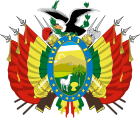 |
|---|
|
|
Bolivia elects on national level a head of state – the president – and a legislature. The president and the vice-president are elected for a five-year term by the people. The National Congress (Congreso Nacional) has two chambers. The Chamber of Deputies (Cámara de Diputados) has 130 members, elected for a five-year term using a two vote seat linkage compensatory system (for mixed-member proportional representation) and in the case of seven indigenous seats by usos y costumbres. The Chamber of Senators (Cámara de Senadores) has 36 members: each of the country's nine departments returns four senators allocated proportionally.[1]
Bolivia has a multi-party system, with numerous parties. During the first 23 years of renewed democracy beginning 1982, no one party succeeded in gaining power alone, and parties had to work with each other to form coalition governments. Since 2005, a single party has achieved a parliamentary majority.
Ahead of any national election a period of prohibition takes effect. This is with the intention of preventing inebriated nationals voting in error. Nationals are also forbidden from travelling around during the same period. This is to prevent voters from voting in more than one district. On polling day it is difficult to obtain a taxi or bus, due to the limitations placed upon travel and transport.
- ^ "Bolivia: Ley del Régimen Electoral, 30 de junio de 2010". Lexivox. Retrieved 10 February 2015.